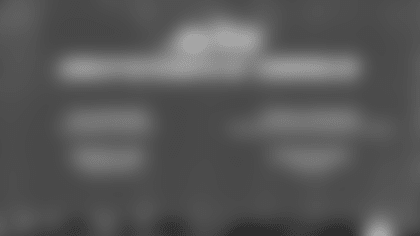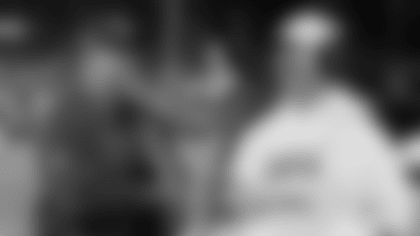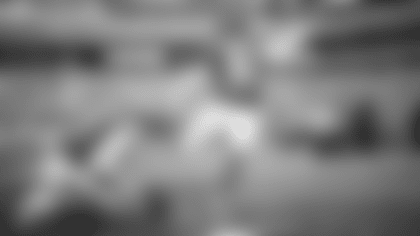The Ten List: Offensive Coordinator Brian Schottenheimer
Today we begin our offseason series The Ten List, a special Q&A series with members of the New York Jets 2006 coaching staff. Our first installment features Offensive Coordinator Brian Schottenheimer, who is entering his first season with the Green & White and eighth in the National Football League.
Coach Mangini said he didn't know a lot about you entering the coaching search, but he said he was very impressed with you during the interview process. How did the connection develop?
I think that when Coach Mangini talks about his philosophy - everything he believes are things that I believe. We both love the game of football; we both love our professions of being coaches. It's a mutual respect, and we have the same fire about us to do the job and do it the best we can.
Coach Mangini said he liked that you were not bound by any conventional thinking. With that being said, how do you make a defense play "left-handed"?
Unconventional is really another way of just getting to know some of your players. We try to find a way to get our players involved by finding out what they do well. The more players we have that can do good things, the more we'll find ways to get them the ball.
*What's the greatest football lesson Marty Schottenheimer ever taught you? *
To play the game one play at a time. You have to focus on staying in the moment, focus on that one play. Do it the best you can. Once it's over move on. Because if something goes good or something goes bad and you let those emotions from the last play affect you, then that takes away from your ability to concentrate and focus on the execution of the next play.
At what age did you decide you wanted to be a coach?
Growing up, I was always around the game. I always loved the game, but when I was a freshman in college at the University of Kansas I made the realization – a tough realization – that I wasn't good enough to play NFL football. But I knew that I wanted to be involved in football, so I made a decision to transfer to the University of Florida, strictly with a focus of learning from Coach Spurrier. I knew at that time that I wanted to follow my father's footsteps and become a coach. I wanted to go on the offensive side of the ball instead of the defensive side of the ball because of my quarterback background. It was during the summer between my freshman year and sophomore year of college that I made my decision. That decision impacted another decision that had me transferring schools, going from KU to Florida, to get my master's degree in football if you will.
Over the years, NFL Films has captured your father addressing his teams in an emotional manner? Do you have a similar fiery approach?
I think passion and enthusiasm are part of the profession, but at the end of the day our number one job is to teach the players what we want and after that demand that they do what we're asking them to do. Coaching in my opinion is twofold. One, teach the players what you want . Two, demand that they do it the way you want them to do it. If you can get a young man to do that, than you are doing your job as a football coach.
You were the "eyes in the sky" for San Diego offensive coordinator Cam Cameron. Do you think you'll remain in the press box or call the game from the sideline? Why?
That depends on a lot of factors . We'll make that decision when the time comes, but I'm comfortable being down or up. I've been in both places and I'm comfortable in either, so that will play itself out as we get closer to the season.
A part of your football education was spent under the tutelage of Steve Spurrier at Florida. You walked on in Gainesville. Looking back on those days, what did he teach you about offensive football?
Probably the creativity; the use of your players. Coach was a great game day coach and he followed the way to feature his best players and plug them into spots where he knew the ball was going to go. He's a great football mind who had a lot of schemes – not that they are so innovative to where no one else has them - but they're good, sound schemes. Being a young player at the time, it was neat to be around a guy whose mind worked as fast and as quick as his does.
What tools did you bring to the table as a quarterback?
First of all I wasn't very talented, but I was smart and I was a good leader. The guys always knew that what they were going to get from me was my very best effort. I made it sound and I kept it interesting. I brought energy to the huddle and stayed out of the way and let the good players be the focus of what we were trying to get done.
Drew Brees flourished in San Diego under yourself and Cam Cameron. How did you take an unproven NFL commodity and transform him into one of the game's most productive signal callers?
I give Drew, first and foremost, a lot of credit. Drew is one of the hardest working
quarterbacks I've ever been around. He did so many things away from the building and away from the office on his own time. I think it was just Cameron and me continuing to push those things that we believed in - the things that we were teaching. We wanted to make sure that he was playing the way that we demanded him to. It's just about having a belief system, making sure you stick to those beliefs, and making sure you continue to ask and demand your players to do those things. He's done a great job himself, taking his tools and the things that we gave him and going out above and beyond that and improving himself.
You have a talented quartet of passers here in New York. What are your expectations for the quarterbacks?
First and foremost they have to be the leaders. They need to lead this group, they have to be smart, and they have to be selfless. They have to understand that the quarterback position is clearly the guy who gets all the scrutiny and all the attention, but at the end of the day he's just one of the guys. We have four great guys who work hard, who are in here all the time and I'm excited to watch them grow and compete, which is something that I think brings out the best in everybody. As long as they do a good job of creating a fast tempo and leading this offensive unit when we're in the huddle, we won't have any problems.
Coach Mangini assembled a diverse coaching staff that blends coaches with many years of experience with coaches of lesser experience as well as former NFL players. Can you tell us about the mixture?
I think Coach Mangini did a great job putting the staff together. Where there's a lot of youth, there's also a lot of experience. I think you take that and you blend our personalities with different amounts of experience, and you put that all together, you have a very solid coaching staff, from experience, from energy, and from enthusiasm. We all get along very well and we enjoy coming to work, we enjoy what we do, and we enjoy being around each other. And that's all you can ask as an assistant coach is to have a head coach that creates an environment where you can feel good about coming to work and knowing that you're well respected and that you're having an impact on the players.














